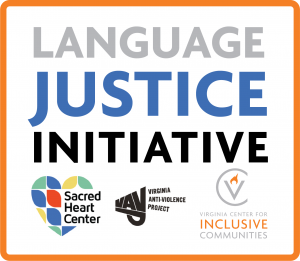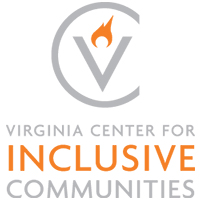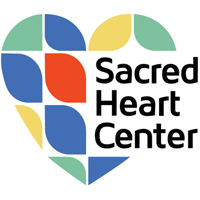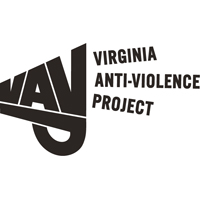RVA Language Justice Initiative
The RVA Language Justice Initiative is working towards ensuring full participation and equity for speakers of all languages in the Richmond area.
Making the Case for Language Justice
“Language justice is about building and sustaining multilingual spaces in our organizations and social movements so that everyone’s voice can be heard both as an individual and as part of a diversity of communities and cultures. Valuing language justice means recognizing the social and political dimensions of language and language access, while working to dismantle language barriers, equalize power dynamics, and build strong communities for social and racial justice.” (Communities Creating Healthy Environments).
Ten percent of our Richmond neighbors are not English speakers. The lack of access to equitable and just multilingual spaces has significant consequences for social determinants of health. For example, direct medical care can be compromised if an interpreter does not understand how to culturally connect with a patient or family member.
Elected officials are unlikely to support policies that support non-English speaking constituents if they don’t hear from those community members. And schools that do not practice principles of language justice see poorer academic outcomes for non-English speaking students, lower rates of attendance, engagement, and participation, and limited parent/family engagement.
A lack of interpreters, translators, resources, and culturally-relevant pedagogy results in negative experiences and outcomes for many non-English speaking students and families in the Richmond region.
In Richmond Public Schools, for example, the Richmond Free Press reported in 2016 that
“Graduation rates for Richmond’s Latino students — a population that has doubled since 2014 — hovered around 50 percent this year… The figures also show that the dropout rate for Latino students in Richmond was 34.7 percent, the highest for any ethnic group in city schools.”
Access Language Justice Resources
The RVA Language Justice Initiative has 50 headsets for simultaneous interpretation that can be rented for $15 for school events, PTA meetings, and community events. If interested in finding interpreters, translators, interpretation equipment, or training through a social justice lens, please contact languagejustice@inclusiveVA.org or use the form below.
Poor educational outcomes are directly linked to other negative outcomes across social determinants of health, including economic stability, healthcare provision, nutrition and exercise, and neighborhood. For example, VCU’s Center on Society and Health states that
“Americans with fewer years of education have poorer health and shorter lives…”
How We Are Engaging Our Community
The RVA Language Justice Initiative is coordinated by the Virginia Center for Inclusive Communities in partnership with Sacred Heart Center and the Virginia Anti-Violence Project. Project components include:
- Making simultaneous interpretation headsets available to the community.
- Mobilizing individuals who are interpreters, translators, allies, and advocates via training, organizing, and collaboration.
- Supporting and training community leaders on the importance of language justice and best practices to effectively improve access to equitable multilingual spaces.
Thank you to the The Bob and Anna Lou Schaberg Foundation for their support of the RVA Language Justice Initiative.
“Language is power. Language can determine whether a person or a community has access to – or is shut out from.”
– Wayside Center for Popular Education



Feedback from Interpreting for Social Justice Workshops
Feedback From Our Training Workshops:
“It was an amazing training and the connection of information and action make all the difference.”
“The training was fabulous! The games and activities really helped me develop interpreting skills. Not only doing the activities, but also going over the meaning behind it and how its significant.”
“(The training) was centered in clarifying the role of the interpreter to make sure that agency is not taken away from people especially the most vulnerable.”

Why Language Justice Is Important:
“Language barriers are a way to restrict agency, important conversations to understand the systems that oppress us happen across identities with different cultural backgrounds.”
“Because in this manner we can advocate for social justice and peace in our communities. It is important to promote inclusion in the following areas: health, immigration, education, housing, law and etc.”
“It allows for events and gatherings to be more open and accessible to everyone who wants to participate, especially the communities that are usually left out because of the lack of accessible language.”
“All people deserve access to resources and the opportunity to be heard and understood. It facilitates the exchange of ideas and information.”
“Because we need an environment that doesn’t create barriers between the community and the government.”



